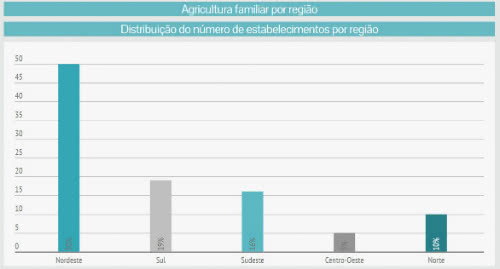THE family farming it is a type of agriculture developed on small rural properties. It receives this name, as it is carried out by groups of families (small farmers and some employees).
The harvest of the products serves as food for them and also for consumption by part of the population.
The importance of family farming
Although it is a very important activity for the livelihood of several families living in the area rural, data show that about 70% of the food consumed in Brazil is the result of agriculture familiar.
It is worth noting that, in this process, cultivation and extractivism techniques that include traditional practices and popular knowledge are present.

In addition, families live off the sale of the products they grow. Therefore, agriculture is an important source of family income, which arises from teamwork carried out in the field.
Family farming contributes to the generation of income and employment in the countryside and also improves the level of sustainability of activities in the agricultural sector. Thus, the quality of the products is superior to other conventional ones.
family farming in Brazil
In Brazil, family farming is present in almost 85% of rural properties in the country. About half of this percentage is concentrated in the Northeast region. The northeast is responsible for about 1/3 of the total production.

However, the difficulties faced by these small farmers and the expansion of agribusiness it has led to numerous social and economic problems.
Mechanization, for example, is a determining factor that has led to the rural exodus of several families. It has considerably decreased employment rates in the countryside.
Without many perspectives, infrastructure and immense social inequality, families are forced to leave the countryside in search of better conditions in the cities.
This also generates a “swelling” in the big cities and, consequently, the marginalization of many people.
In addition to mechanization, agribusiness presents a production model based above all on profit. Thus, the use of pesticides and monoculture on large properties has been aggravating the problems of families living in the countryside.
However, the resistance of many families has still been essential to reduce the environmental impact caused by modern systems.
In 2006, Law No. 11 326 was considered an advance in the definition of public policies for the sector.
Among other things, it establishes concepts, principles and guidelines for creating a policy consistent and efficient national network linked to family farming and rural family businesses.
“Art. 4: "The National Policy on Family Agriculture and Rural Family Enterprises will observe, among others, the following principles:
I - decentralization;
II - environmental, social and economic sustainability;
III - equity in the application of policies, respecting the aspects of gender, generation and ethnicity;
IV - participation of family farmers in the formulation and implementation of the national policy on family farming and rural family businesses.”
Products grown in family farming
The main characteristic of family farming is associated with polyculture, that is, the planting of different types of products.
In all biomes of the country, there are products that are commercialized by family farmers.
Fruits, vegetables, vegetables and animals stand out, the main ones being corn, coffee, cassava, beans, rice, wheat, milk, pork, beef and poultry.
family farming and sustainability
As it prioritizes traditional cultivation practices and low environmental impact, family farming has been a great ally of sustainability and socio-environmental responsibility.
In such a way, it adopts more sustainable cultivation practices with the production of organic food.
However, the advance of mechanization has been an aggravating factor for the environment, populations and even the local fauna and flora.
The use of pesticides and deforestation for the cultivation of products (such as soy, for example) has caused a great environmental impact on several ecosystems.
Pollution, soil impoverishment and desertification have been generated by the current agribusiness system.
Gradually, it has dominated the agricultural scene in the country and is destabilizing and directly affecting the environment.
Therefore, government programs and projects have been essential to act on the resistance of families collaborating with the quality of life of these people, and especially of the products grown in a smaller scale.
Highlights include the PRONAF (National Program for Strengthening Family Agriculture), the National School Feeding Program (Pnae) and the Programa Garantia Safra.
Did you know?
In 2011, the United Nations General Assembly declared 2014 the "International Year of Family Farming". This was a big step towards recognizing the importance of family farming in the world.
read more:
- Agriculture
- Organic agriculture
- subsistence farming



